 |
|
Adv. Wessel Oosthuizen, Director of the CFPL, and Gerhard Meyer, Chairperson of the Board of Directors, Financial Planning Institute of Southern Africa.
Photo: Stephen Collett
|
At this year’s graduation ceremony, the Centre for Financial Planning Law (CFPL) at our university awarded 377 diplomas (305 to students in the Postgraduate Diploma in Financial Planning, and 72 to students in the Advanced Postgraduate Diploma in Financial Planning).
Three students in the Advanced Postgraduate Diploma passed the diploma with distinction. They are David Grant, Stephen Grizic and Yashika Rambujan. Ruan Schroder, Daniel Venter and Adri Viljoen passed the Postgraduate Diploma with distinction. Adri Viljoen is also the overall top student in the Postgraduate Diploma, while David Grant is the overall top student in the Advanced Postgraduate Diploma.
During another highlight at this event, Adv. Wessel Oosthuizen, Director of the UFS’s CFPL, was awarded the Chairman's Award for outstanding lifetime contribution to the Financial Planning Industry. This award is made by the Chairman of the Board of Directors of the Financial Planning Institute of Southern Africa to a person who has made a significant and extraordinary contribution to the financial planning industry. As this is only the second year that the award is being made, it is an exceptional honour.
For five years, the UFS was the only institution to offer a full qualification in order to become a Certified Financial Planning Professional. The university is still the largest institution in this regard. The Centre for Financial Planning Law (CFPL) at the UFS is also the only institution in South Africa to offer the Advanced Postgraduate Diploma in Financial Planning Law, which is a purely specialisation diploma.
To date, the CFPL at our universityhas awarded 3 657 Postgraduate Diplomas and 659 Advanced Postgraduate Diploma in Financial Planning.